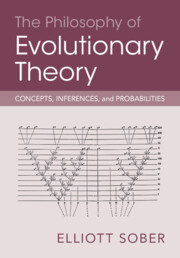Book contents
- The Philosophy of Evolutionary Theory
- The Philosophy of Evolutionary Theory
- Copyright page
- Dedication
- Contents
- Figures
- Tables
- Preface
- Acknowledgments
- 1 A Darwinian Introduction
- 2 Fitness and Natural Selection
- 3 Units of Selection
- 4 Common Ancestry
- 5 Drift
- 6 Mutation
- 7 Taxa and Genealogy
- 8 Adaptationism
- 9 Big-Picture Questions
- References
- Index
5 - Drift
Published online by Cambridge University Press: 01 February 2024
- The Philosophy of Evolutionary Theory
- The Philosophy of Evolutionary Theory
- Copyright page
- Dedication
- Contents
- Figures
- Tables
- Preface
- Acknowledgments
- 1 A Darwinian Introduction
- 2 Fitness and Natural Selection
- 3 Units of Selection
- 4 Common Ancestry
- 5 Drift
- 6 Mutation
- 7 Taxa and Genealogy
- 8 Adaptationism
- 9 Big-Picture Questions
- References
- Index
Summary
● Francis Galton helped invent a model that describes how family names can disappear from a population purely by chance; it provides a good entrée to the subject of neutral evolution. ● Strict neutrality needs to be distinguished from near neutrality. With strict neutrality, each token allele at a locus has a probability of 1/2N of eventually going to fixation if the population is diploid and contains N individuals; there is strict neutrality here because there is zero variation in fitness. ● The relationship of strict neutrality to the hypothesis of a molecular clock is clarified. ● Strict neutrality is a null hypothesis; the epistemic status of null hypotheses is discussed – are they default assumptions, to be viewed as innocent until proven guilty? ● Alternatives to the hypothesis of strict neutrality are discussed, including Tomoko Ohta’s theory of near neutrality, which says that nearly all genes are strictly neutral or slightly deleterious. ● Whether drift is a cause of evolution, and whether it is a process distinct from natural selection, are discussed, and so is the question of what it means for drift to be a stronger cause than selection in the evolution of an allele.
Keywords
- Type
- Chapter
- Information
- The Philosophy of Evolutionary TheoryConcepts, Inferences, and Probabilities, pp. 110 - 140Publisher: Cambridge University PressPrint publication year: 2024

